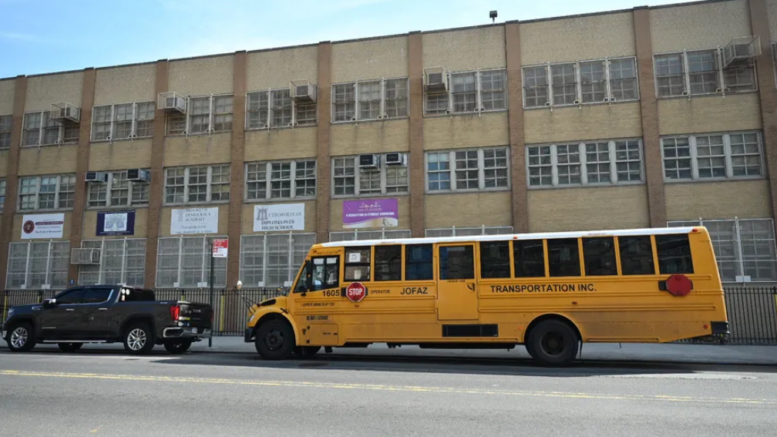Homeless students and those with disabilities who receive round trip busing during the school year could be excluded from a significant chunk of the city’s summer school program due to lack of transportation, a move that advocates argue violates the law.
“The [education department] claims that ‘All New York City students will have an opportunity to participate in the program,’” Rebecca Shore, the litigation director at Advocates for Children, wrote in a Friday letter to a top education department lawyer. “In practice, however, the DOE’s refusal to provide bus service to those students with disabilities or students in temporary housing who require it results in the exclusion of students.”
Shore’s letter argues that the city’s transportation plans this summer run afoul of federal laws that require “equal access” for students with disabilities in programs that are available to all students and a state law that requires transportation for students in temporary housing if needed.
The city’s “Summer Rising” program, which launches next month, aims to revamp traditional summer school to include field trips and outdoor activities. Mornings will focus on academics, while afternoons will be filled with enrichment and largely staffed by community-based nonprofit organizations. While there will be busing home for some students after the academic portion of the day wraps up, no students will be bused home after the second part of the day, which ends at 4 p.m. for middle school students and 6 p.m. for elementary students. (The structure of the high school program varies.)
The lack of bus service at the end of the full day could exclude some students from the enrichment program if their families are unable to make other travel arrangements, advocates said.
For the first time, the summer program is open to any student who wants to participate, rather than focusing on students who are behind, and officials anticipate up to 190,000 students could enroll. But parents of students with disabilities have already raised concerns about whether the city will provide the special education services and staff their children need to participate. The transportation issue is one more potential barrier.
About 50,000 students with disabilities are entitled to receive bus service during the school year, including some students with physical disabilities who use wheelchairs. Among those students, only those who are in year-round special education classrooms or are required to attend summer school due to their academic performance will receive busing — again, only for the morning instructional part of it.
Similarly, students who live in temporary housing will only be eligible for bus service to and from the morning instructional program — and only if they are also required to attend summer school. Roughly 5,000 students in temporary housing receive transportation during the school year, including those who live far from public transit.
City officials did not respond to questions about why they are not providing bus service at the end of the day for students who may need it nor did they respond directly to the Advocates for Children letter claiming the summer program’s bus service violates federal and state law.
“With twice as many locations across the City than prior summer programs, Summer Rising was designed to provide families with programs that are close to home, and we will work closely with individual schools and families to ensure our students’ needs are supported for their return trip home,” Sarah Casasnovas, an education department spokesperson, wrote in a statement. She noted that students who attend summer school would be eligible for MetroCards.
Still, some legal experts said the city is obligated to provide bus transportation if students with disabilities need it to effectively participate, even if the second portion of the day is largely focused on enrichment and outdoor activities rather than academics.
“They have to provide the same kind of accommodation they do during the school year,” said Ron Hager, a managing attorney at the National Disability Rights Network. “It would be very hard for [the city] to make an argument that they don’t need it.”
This article was originally posted on Summer school busing gap could exclude homeless students and children with disabilities, advocates fear

Be the first to comment on "Summer school busing gap could exclude homeless students and children with disabilities, advocates fear"